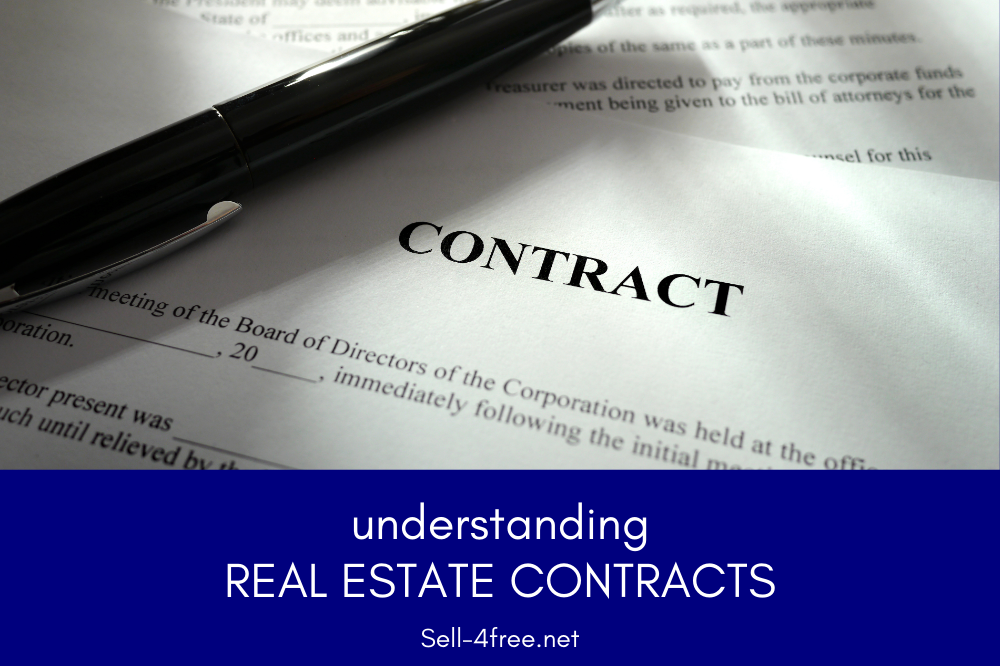Understanding Real Estate Contracts: Key Terms for Home Sellers

Selling a home involves navigating real estate contracts, which can seem complicated if you’re unfamiliar with the language. Understanding key terms in these contracts can help you feel confident as you move through the process, whether you’re a first-time seller or have sold homes before. This guide offers a clear explanation of real estate contract terms to help you make informed decisions when selling your property.
Understanding Real Estate Contracts: Key Terms for Home Sellers
In today’s market, understanding the details of real estate contracts can give home sellers an advantage, helping you feel more at ease and prepared during the selling process. Knowing what each term means can also help you avoid potential misunderstandings and ensure a smoother transaction. This guide explains the following:
- The difference between an offer and a contract
- Earnest money and its role in the sale
- Contingencies and their impact on your sale
- What “as-is” means in a contract
- Closing costs and what sellers typically pay
Here’s a closer look at each.
The Difference Between an Offer and a Contract
An offer and a contract may seem similar, but they have distinct roles in the home-selling process. An offer is the initial proposal a buyer makes to purchase your home. It typically includes the proposed price, earnest money amount, and contingencies. Once you accept the offer, it becomes a contract — a legally binding agreement between you and the buyer that outlines the terms and conditions of the sale. Before signing the contract, review the terms carefully to ensure you understand and agree to all the details. If you need further clarification, consulting a real estate agent or attorney can be helpful.
Earnest Money and Its Role in the Sale
Earnest money is a deposit the buyer provides as a show of commitment to purchasing your home. This money is usually held in an escrow account and applied to the buyer’s down payment or closing costs if the sale proceeds. Earnest money also serves as a form of security for you, the seller; if the buyer backs out without a valid reason, you may have the right to keep the earnest money as compensation. Generally, the amount of earnest money varies, but it’s often between 1% to 3% of the sale price.
For more on escrow accounts and earnest money, visit the Consumer Financial Protection Bureau (CFPB).
Contingencies and Their Impact on Your Sale
Contingencies are conditions that must be met for the sale to proceed. Common contingencies include financing, inspection, and appraisal. If the buyer fails to meet these conditions, they may have the option to back out of the contract without losing their earnest money. Here’s a breakdown of common contingencies:
- Financing Contingency: Protects the buyer if they can’t secure a mortgage for the home.
- Inspection Contingency: Allows the buyer to negotiate repairs or withdraw if significant issues arise during the home inspection.
- Appraisal Contingency: Protects the buyer if the home appraises for less than the agreed-upon purchase price.
As a seller, it’s important to understand how contingencies may delay or impact the sale. Negotiating contingencies can sometimes speed up the sale process, but it’s essential to weigh the potential risks.
What “As-Is” Means in a Contract
An “as-is” clause in a real estate contract indicates that you, the seller, will not make any repairs or improvements before the sale. The buyer agrees to accept the home in its current condition. Selling “as-is” can be an attractive option if you want a quick sale without the hassle of repairs. However, it’s important to know that buyers might expect a lower price for an “as-is” property since they’ll need to account for potential repair costs. Additionally, buyers may still request an inspection and could withdraw their offer if significant issues are discovered.
Closing Costs and What Sellers Typically Pay
Closing costs are fees associated with finalizing the sale of your home. Both buyers and sellers pay closing costs, although the specific costs for each party can vary by state and negotiation. Common closing costs for sellers include:
- Agent Commissions: Typically, the seller pays the real estate agent commissions, which are usually 5-6% of the sale price.
- Title Insurance: Protects against issues with the property title that may arise after the sale.
- Transfer Taxes: State or local taxes on the transfer of the property’s title.
- Outstanding Property Taxes: Any remaining taxes owed up to the sale date.
It’s helpful to discuss these costs with your REALTOR® to better understand how they may affect your proceeds from the sale. For additional information on closing costs, refer to resources from the U.S. Department of Housing and Urban Development (HUD).
FAQ About Real Estate Contracts for Home Sellers
Check out these commonly asked questions about real estate contracts. If you don’t see your question here, please call our office and we’ll find you the answers you need.
What Happens if a Buyer Backs Out of a Real Estate Contract?
If a buyer backs out of a real estate contract, the outcome often depends on the contract terms and contingencies. If they withdraw for a reason covered by a contingency, they may get their earnest money back. However, if the buyer backs out without a valid contingency, you may be entitled to keep the earnest money as compensation for lost time and effort.
Can I Negotiate Contingencies in the Contract?
Yes, sellers can negotiate contingencies as part of the contract. For example, you could agree to certain contingencies, like a financing contingency, while limiting the inspection or repair contingencies. Discussing contingency options with your REALTOR® helps you understand which terms can be negotiated based on your goals and the market conditions.
What Are the Seller’s Responsibilities Before Closing?
Before closing, sellers are typically responsible for ensuring the home is in the agreed-upon condition, completing any agreed repairs, and preparing documents such as the title deed. Sellers should also vacate the property by the agreed date unless otherwise specified in the contract.
Can a Real Estate Contract Be Canceled?
Real estate contracts can sometimes be canceled if both parties agree, or if certain conditions outlined in the contract are not met. However, canceling a contract without valid reasons can have legal or financial consequences, so it’s best to work with a real estate agent or attorney if you’re considering cancellation.
What Should I Look for in a Real Estate Contract?
When reviewing a real estate contract, look for key details like the sale price, contingencies, closing date, and any specific clauses, such as “as-is” terms. Ensuring you understand all parts of the contract helps prevent misunderstandings and keeps the process on track.
Understanding real estate contracts can give you confidence as you navigate the home-selling process. By knowing key terms and working closely with your REALTOR®, you can move forward with greater assurance, knowing you’re well-prepared for every stage of the sale.
3265 Foxridge Drive Jasper, Indiana
5 Beds 5 Baths 5,171 SqFt 0.896 Acres
Listing courtesy of BrendaWelsh from SELL4FREE-WELSH REALTY CORPORATION.
1800 E Greener Road Jasper, Indiana
3 Beds 4 Baths 5,001 SqFt 5 Acres
Listing courtesy of BrendaWelsh from SELL4FREE-WELSH REALTY CORPORATION.
1430 Timber Creek Drive Jasper, Indiana
5 Beds 3 Baths 4,018 SqFt 0.75 Acres
Listing courtesy of ElizabethMehringer from RE/MAX Local.
1778 Scarlet Oak Drive Jasper, Indiana
4 Beds 5 Baths 4,427 SqFt 0.754 Acres
Listing courtesy of BrendaWelsh from SELL4FREE-WELSH REALTY CORPORATION.
3289 St. Charles Street Jasper, Indiana
4 Beds 4 Baths 3,906 SqFt 0.595 Acres
Listing courtesy of BrendaWelsh from SELL4FREE-WELSH REALTY CORPORATION.
1089 N 400 W Road Jasper, Indiana
3 Beds 2 Baths 2,940 SqFt 14.82 Acres
Listing courtesy of BryceLain from SELL4FREE-WELSH REALTY CORPORATION.
1822 W 5th Street Jasper, Indiana
3 Beds 3 Baths 2,964 SqFt 0.96 Acres
Listing courtesy of BrendaWelsh from SELL4FREE-WELSH REALTY CORPORATION.
1679 W 1st Street Jasper, Indiana
3 Beds 3 Baths 2,546 SqFt 0.35 Acres
Listing courtesy of SteveLukemeyer from F.C. TUCKER EMGE.
307 Newton Street Jasper, Indiana
4 Beds 2 Baths 3,490 SqFt 0.37 Acres
Listing courtesy of AndrewWelsh from SELL4FREE-WELSH REALTY CORPORATION.
463 E State Road 164 Jasper, Indiana
4 Beds 3 Baths 3,802 SqFt 1 Acres
Listing courtesy of BrendaKrempp from RE/MAX Local.
Are You Thinking of Buying a Home in Dubois County?
Use our site to search homes for sale in Jasper, Dubois, Spencer, Martin and Davis counties, as well as all the surrounding communities. Unlike the “big name” sites out there, at Sell 4 Free Welsh Realty, our site is directly connected to our local MLS. We update it with new homes every hour.
Sign up for new listing alerts so you can stay on top of the newest homes for sale – and get price change alerts so you can stay ahead of other buyers and beat them to the hottest deals!
Start Your Home Search Here
Popular Jasper, Indiana Home Searches:
- Homes for sale Evansville, IN
- Southern Indiana homes for sale
- Santa Claus, Indiana cabins
- Homes for sale Newburgh, IN
- Homes for sale Dubois County, Indiana
- Homes for sale in Jasper, Indiana
- Homes for sale in Huntingburg, Indiana
- Ferdinand, Indiana homes
- Farms for sale in Indiana
- Homes for sale in Santa Claus, Indiana
Newest Homes for Sale in Dubois County
View the newest homes listed in Dubois County in the last 10 days:
394 Lechner Lane Jasper, Indiana
3 Beds 3 Baths 1,513 SqFt 0.28 Acres
Listing courtesy of BrendaWelsh from SELL4FREE-WELSH REALTY CORPORATION.
3711 S St Rd 162 Highway Huntingburg, Indiana
2 Beds 2 Baths 1,066 SqFt 2.29 Acres
Listing courtesy of AndrewWelsh from SELL4FREE-WELSH REALTY CORPORATION.
4096 E South Street St. Anthony, Indiana
3 Beds 2 Baths 1,818 SqFt 0.25 Acres
Listing courtesy of BrendaWelsh from SELL4FREE-WELSH REALTY CORPORATION.













